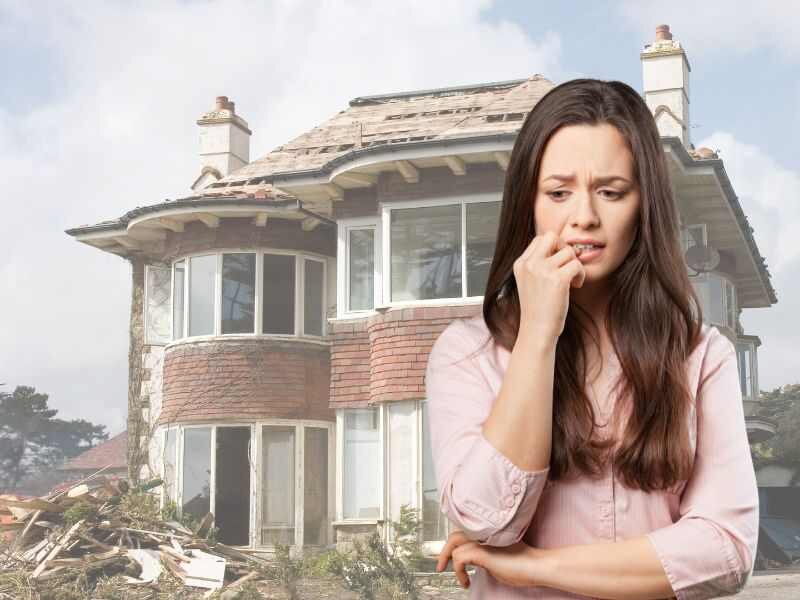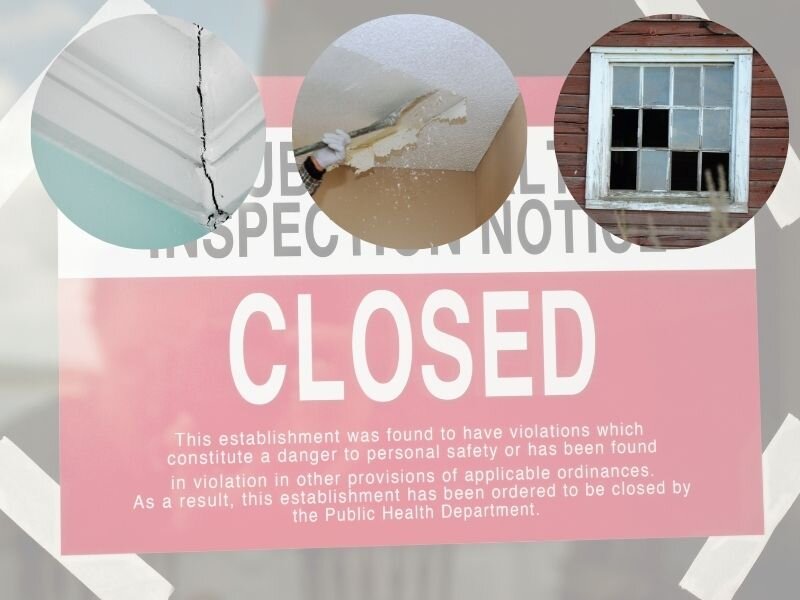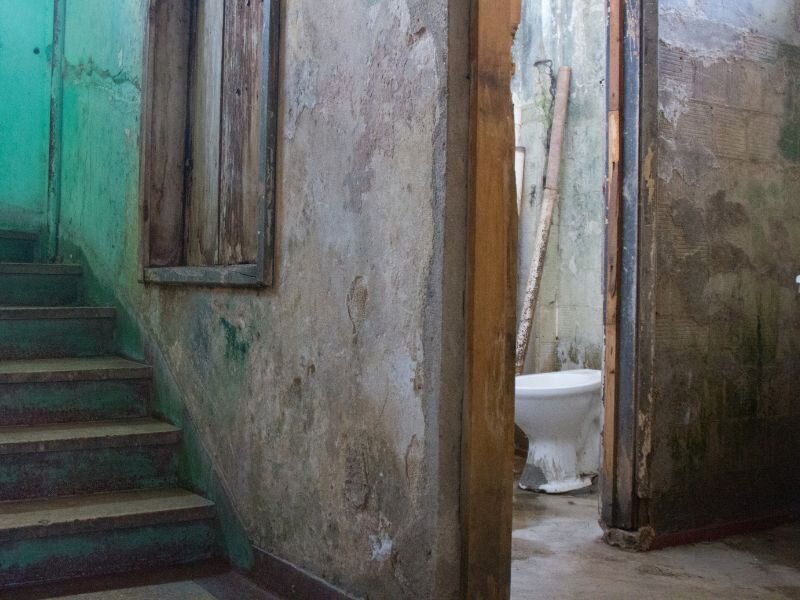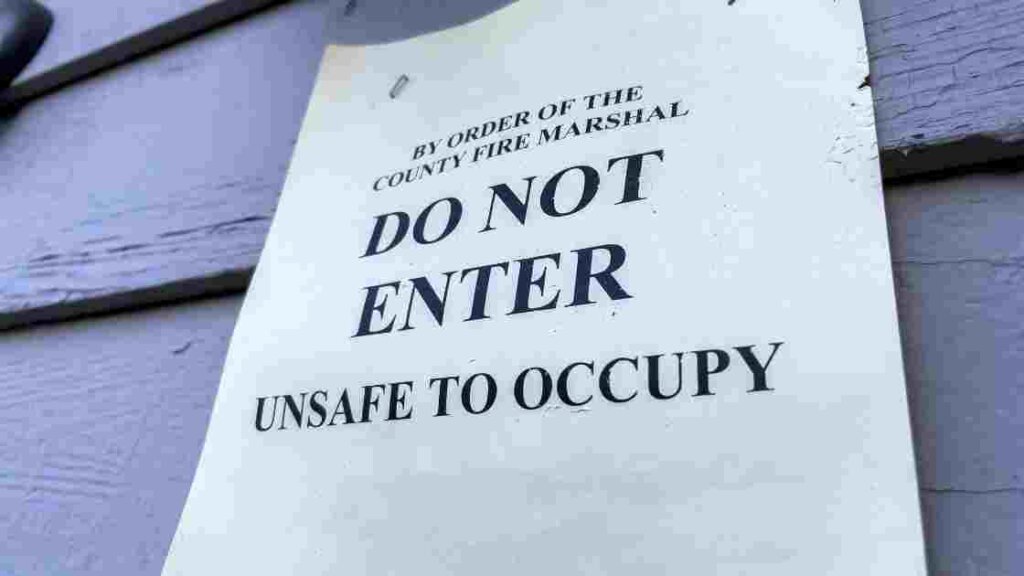

Living in a condemned house in Stockton can be tough and stressful. A condemned house is a property that is unsafe to live in due to issues such as rule violations, structural damage, health hazards, and fire risks. When a house is condemned, it means that the government says it’s not safe to live there anymore due to safety concerns, and this can significantly affect your ability to sell your home. In this blog, we’ll talk about why a house might get condemned, what happens to the people living there when that happens, and what they can do next.
Reasons for a House to Become Condemned

There are a few reasons why a house might become condemned. Not following the rules about how homes should be kept, having damage to the structure, dangers to health, and fire risks are some common reasons. Breaking housing rules, like not fixing plumbing or electrical problems, or having housing code violations, can lead to a house being condemned, stressing the importance of maintaining a property to avoid it becoming unfit for anyone to live in. Structural damage means big problems with how the house is built, like issues with the foundation or roof, often rendering it unfit for a home buyer. Health dangers can come from things like bugs, bad air inside, or harmful materials like lead and asbestos. Fire risks, like old electrical systems, bad heating, or improperly storing flammable things, can make a house unsafe and contribute to why a property can be condemned.
Structural Damage
When a house is condemned because of significant structural damage, it means there are serious problems with how strong and safe the building is. Signs of this kind of damage can be cracks in walls, ceilings that are drooping, or walls that are starting to lean. These signs show that the structure of the house is not stable and could be dangerous for people living there. The local government decides if a house should be condemned based on how bad the structural problems are, affecting decisions on whether to demolish or sell a condemned house. If they think it’s not safe to live in, they can tell the people to leave by giving them a condemnation notice. This process is done to keep people safe by not letting them stay in a house that could be dangerous because of its structure or might need to be demolished for safety, particularly when a property is considered condemned.
Health Risks

Staying in a condemned house can be bad for your health, emphasizing the importance of knowing when to move on or if it’s possible to remediate the issues making the house condemned. One big health problem in condemned homes is having lots of pests, illustrating why condemned houses often result in negative community outcomes. Rodents, bugs, and mold like to live in houses that are not taken care of well. These pests can make people sick, cause allergies, and even harm the building’s structure more, which are reasons that a house can become condemned. Also, condemned houses usually have air inside that’s not healthy, which can lead to breathing issues and other health troubles, underscoring the importance of addressing the reasons that a house can be condemned. Not having good airflow, having water damage, and having harmful things like mold or asbestos around can all make the air inside bad for you, making the property uninhabitable.
When homes are condemned and left in bad shape, it doesn’t just affect the people living there, but the whole community too, underlining the consequences of what happens when a house gets condemned. Neglected houses can become a place where pests and other critters like to live, and they can move to other nearby homes, which underscores why condemned houses often attract further intervention. This can make people in the neighborhood sick and can be a problem for the whole community, not just the people living in the condemned houses. Additionally, severe pest infestations in condemned houses can pose serious health risks for both the residents and the surrounding community. It is important to address these issues promptly to prevent the further spread of pest infestations and potential health hazards, rendering the house unfit for habitation.
Code enforcement is really important in finding health risks in condemned properties, which can affect homeowners’ ability to sell a house that has been condemned. Code enforcement officers make sure that buildings follow the rules about health and safety. They check if properties are good for people to live in and take steps against property owners who don’t keep up with the rules. The goal of code enforcement is to keep the community healthy by fixing problems in condemned homes, ensuring that no property is considered condemned without cause.
Fire Hazards
Fire safety becomes a significant concern in houses deemed unfit for anyone to live, especially when the property can be condemned for such deficiencies. These homes often have things that can make fires more likely. Faulty electrical systems, old or malfunctioning heating systems, and incorrect storage of flammable materials can all contribute to the danger of fire in condemned homes. Local bodies, such as the housing authority, play an important role in detecting and resolving fire threats. They seek to guarantee the safety of both the tenants of the condemned house and the adjacent properties by examining condemned houses for fire hazards and adopting safety measures to prevent them from becoming uninhabitable.
Living in a condemned house can be risky for your health and safety, and it might be time to consider if it’s possible to fix a condemned house or if it’s better to move on. It’s important to know what happens to homeowners and residents when a house gets condemned and what choices they have for the future, especially if they need to sell a condemned home.
Related Post: The Ultimate Guide to Condemned Houses
What Happens in Post Condemnation?
What happens when a house is condemned by authorities, and how does this impact your ability to sell your house that has been condemned? Discover the potential outcomes post-condemnation, including eviction possibilities and the pros and cons of opting to sell a house that has been condemned. Learn more about the aftermath of living in an uninhabitable house and how to determine if it’s possible to fix a condemned property.
The Possibility of Eviction
Residents living in condemned houses may face eviction due to safety hazards present. If repairs are not viable, eviction from such a property might be unavoidable, forcing residents to vacate. Health risks associated with a condemned house can escalate the chances of being asked to leave. Displaced individuals may receive support services upon eviction from a condemned property. Authorities need to adhere to legal processes when carrying out evictions in such cases.
Selling the Property: Pros and Cons
Cash bids for a condemned house can help owners avoid further legal troubles. While advantageous in a legal sense, finding purchasers for such properties can be difficult, but not impossible, especially when you need to sell your home fast to cash home buyers. Real estate investors, who specialize in buying distressed or condemned properties, can be a viable option for selling a condemned property quickly. They are experienced in dealing with properties that require extensive repairs and can offer a fair price for the property. However, it is important to do thorough research and choose a reputable investor. On the other hand, working with a real estate agent can also be beneficial as they have knowledge and experience in selling properties, including those that are condemned, which can be a viable option if you need to sell your house fast. They can also ensure transparency and honesty in the selling process, vital for someone looking to sell a condemned home.
Rights of Homeowners and Residents of Condemned Houses
Living in a condemned house can bring about a lot of problems. It can lead to legal issues, like getting kicked out of the house, and homeowners have to think about whether they should sell it. If the house is in bad shape, the government or local authorities might step in and decide to take control of it for public use. It’s crucial to know your rights if you own the property, especially if it has been condemned due to building code violations. When you receive a notice saying your house is condemned, you may need to get legal advice to deal with the code violation. Poor living circumstances can have an impact on community health, highlighting what happens to condemned houses if left unaddressed. So it’s critical to strike a balance between your rights as a homeowner and the requirements of the public, especially when a property might need to be vacated or demolished, or if you’re in a position where you need to sell your house fast due to condemnation.
Implications of Living in a Condemned House
Living in a condemned house can bring legal troubles from the local government, and you might have to leave for safety reasons, emphasizing the challenges for an owner of a condemned property. It can also cost you money, disrupt your services, and even lead to serious health problems. If the government decides to take over your property for public use, it could affect your rights as a resident. The notice of condemnation can affect the whole community, possibly leading to the need for new homes for those affected and highlighting the urgency when a home has been condemned. When the government exercises eminent domain due to poor conditions, they are trying to balance your rights as a homeowner with the rules they have to follow, as determined by local authorities, especially when a house has significant structural damage.
Legal Rights and Responsibilities
When a property is condemned, owners have to make repairs to meet the rules, and residents living in the house at the time can argue against the condemnation decision. The rights and responsibilities of private owners living in condemned homes can vary based on local laws. Owners must follow instructions from housing authorities to avoid legal problems. If they don’t follow the orders, they could face legal consequences.
Can You Restore a Condemned House?
Restoring a condemned house is possible with proper renovation and necessary repairs. Understanding local regulations, hiring professionals, and investing time can bring the house back to livable conditions. Knowing how to prevent future condemnation is key.
Repairing and Renovating Condemned Houses
When fixing up condemned houses, it’s important to focus on safety hazards and making necessary repairs to any structural damage. Renovating these homes usually means meeting building codes to make sure everything is up to standard for people to live in, and evaluating if the cost of repairs makes the property quickly ready to sell. It’s essential to take care of any structural problems to make the property safe, particularly for those looking to sell a house fast that has been condemned. Getting help from a lawyer might be a good idea while renovating. Revamping condemned houses can be appealing to investors who are on the lookout for new properties.
How to Prevent Future Condemnation?
Preventing future condemnation involves regular home inspections to ensure safety, which is vital for homeowners who wish to avoid being in a situation where they need to sell a house that has been condemned. Promptly addressing structural issues like complying with housing codes seeking legal advice for property compliance, and maintaining homes in good condition are key steps to prevent future condemnation.
Dealing with Mortgages on Condemned Houses
Financial Implications
Condemned house property owners may face financial consequences, resulting in cash offers below market value when sold, especially from investors looking to buy ugly houses. Due to mortgage concerns, necessary repairs increase the financial load and influence the property’s fair market value, affecting the options to buy houses in similar conditions. Property owners should examine the risks of condemnation, considering the financial implications of the condemned status for property value and potential losses.
Seeking Legal Advice
When facing the condemnation process, seeking legal advice is crucial for property owners. Legal guidance on condemned properties aids in navigating the proceedings smoothly. It assures local government compliance and provides the best outcomes for households that become condemned, especially for those looking to sell a house that has been condemned. In such cases, seeking legal representation is vital to protecting property owners’ rights and interests.
The Bottom Line
Living in a condemned house in Stockton can be extremely harmful in many ways, including your safety, health, and legal standing. The difficulties are substantial, ranging from the structure crumbling apart to being forced out. It’s critical to understand your rights as an owner or occupant of a condemned property. While it is feasible to repair a condemned house, it is critical to take preventative measures and seek legal assistance. If you’re dealing with a condemned house, hiring expert guidance can help you understand the process and effectively protect your rights. Your health and future deserve the care and attention required for a secure and stable living environment.

Get Fast Cash for Your Condemned House with Click Cash Home Buyers!

For homeowners with condemned properties, Click Cash Home Buyers offer a quick solution. We buy houses in any condition, taking on the challenge of unsafe properties. Sell your condemned house to us to avoid the market hassle. Trust us to handle your property concerns efficiently and start fresh with ease!
Contact Us
We would love to hear from you! Please fill out this form and we will get in touch with you shortly.



